When Jesus told the parable of the sower, he focused on the soil. The meaning of the Parable of the Sower has a lesson that still rings true today and it speaks about the soil of our hearts.
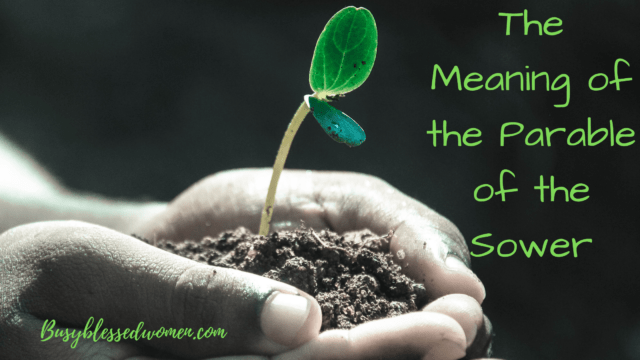
What is the Parable of the Sower?
We find the parable of the sower in the gospels of Matthew (13:1-23), Mark (4:1-20) and Luke (8:1-15). (It is not in John’s gospel because John did not record any parables. Did you know this? I did not!)
We also know it as the Parable of the Soils. Both are accurate; Jesus told this parable to illustrate what happens when a farmer sows seeds on different soil, and the results that unfold.
The enormous crowd that gathered around would have been very familiar with the concepts of sowing seed. The farmer would have reached into a bag of seed and toss it across the ground. Naturally, all of it didn’t land on the best soil.
What do the seeds represent in the Parable of the Sower? Luke’s version gives us the best answer as Jesus explained it this way to His disciples- “The seed is the word of God.” v11.
This parable explains what happens when people hear the gospel message.
Parable of the Soils
We are going to reference Matthew’s NIV version. Jesus begins:
“A farmer went out to sow his seed. As he was scattering the seed, some fell along the path, and the birds came and ate it up.” vv3-4.
When the farmer threw the seed, some escaped the fertile soil of the field. Hard-packed walking paths bordered the fields. The seed that ended up here made an easy meal for the birds.
The compressed soil of the path represents those who hear the words of Jesus but either dismiss it or don’t want to take the time to understand it. Their hearts are as hard as the paths.
Rocky Soil Parable
“Some fell on rocky places, where it did not have much soil. It sprang up quickly because the soil was shallow. But when the sun came up, the plants were scorched, and they withered because they had no root.” Matthew 13:5-6.
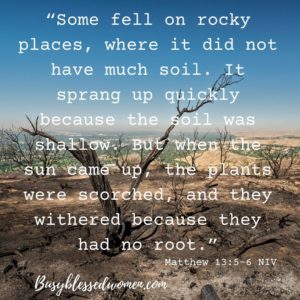
What does the rocky soil represent in the Parable of the Sower?
The seed that falls on the rocky ground represents the person who hears and is initially enthusiastic. But their interest is as shallow as the thin soil among the rocks, and their enthusiasm dries up. The rocky soil may also represent a hardship or trial in their lives that blocks the growth of the seed. Either way, the result is the same- their interest withers away.
Thorny Soil
“Other seed fell among the thorns, which grew up and choked the plants.” Matthew 13:7.
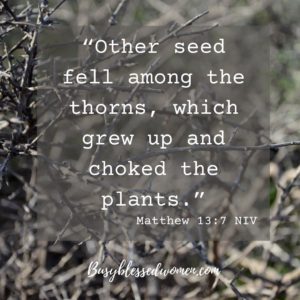
Thorns can grow anywhere the wind drops their seeds. They aren’t particular about the soil or their water requirements. There were no herbicides in Jesus’ day. The thorns in the fields easily grew and choked out the growth of the newly planted seeds.
Thorns also grew in thick, tangled hedges near the edge of the fields. Any seed that landed there had virtually no chance of getting the sunlight and nourishment they needed to grow.
What do the thorns represent in the Parable of the Sower?
The person whose heart is like the thorny soil hears the words of Jesus, but other things choke it out of their lives. Money, jobs, anxiety, relationships, etc. become their #1 focus and their thorns. These things crowd the message of Jesus out of their hearts.
Sowing Seed on Good Ground
“Still other seed fell on good soil, where it produced a crop-a hundred, sixty or thirty times what was sown.” Matthew 13:8.
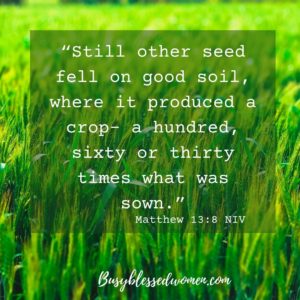
The seed sown into good soil grows well and produces a plentiful crop. Variances in the rain and/or temperature can bring changes in the crop’s outcome, but the good soil gives the seed exactly what it needs to put down deep roots and grow into a healthy, productive plant.
What is the Lesson of the Parable of the Sower?
Jesus ends His parable with the words “He who has ears to hear, let him hear!” v9.
He was telling the crowds (and us) to pay close attention to what He was saying. He’s asking us to look carefully into the meaning of His words for our own lives.
Who is the Farmer in Matthew 13?
God (the farmer) sows the seed (His Word). It is the “soil” that it lands on that determines its growth.
The deeper lesson in this parable is one about God’s Word and the responses from those who hear it. Not everyone who hears Jesus’ words will listen or respond to it because we can have a “soil problem” in our hearts.
Jesus knew at the time that the crowd contained people who would be indifferent to His message. Times haven’t changed in that regard. But that did not stop Him from sowing His Word to them.
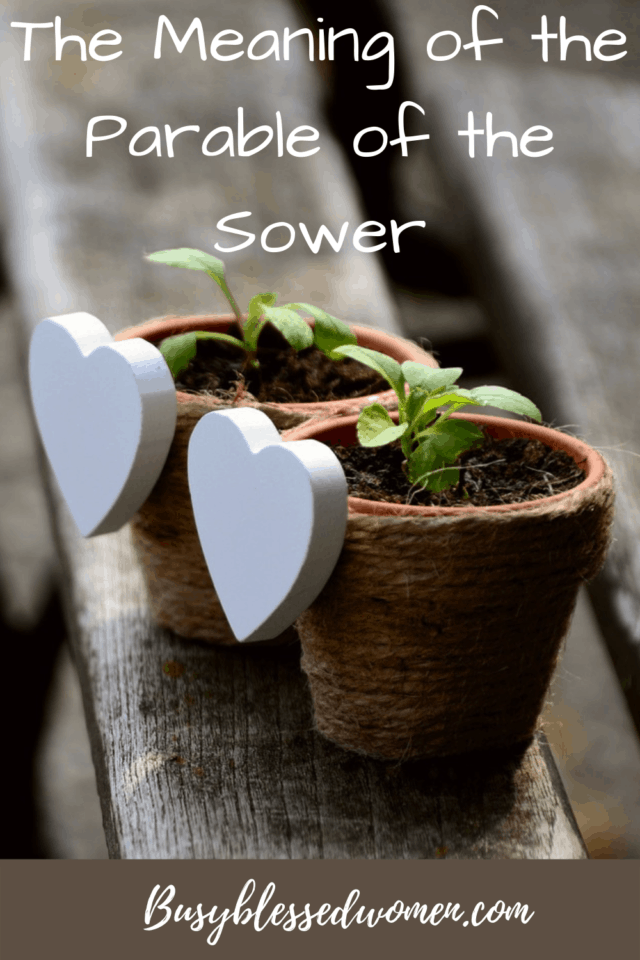
Pin me for later!
What is the Main Message of the Parable of the Sower?
Jesus wanted to impress the importance of the state of our hearts when we read, hear, and study His Word. We decide what kind of soil we have.
Just as living plants need fertile, well-watered, sun-kissed soil, we too need to make sure we optimize the soil of our hearts for growth.
We need to evaluate our “soil”: Is my heart hardened with an obstinate or blind streak in hearing His Word and refusing to obey it? Have I hardened my heart with excuses for not listening?
Is my heart soil so shallow that no deep roots can grow to support His word?
Maybe our heart soil is crowding out the growth of His word with the cares and responsibilities of our life.
Jesus cautions us against all these things that lead to less optimum growth of His word. His desire is for our hearts to be receptive to Him when He speaks to us. Only we can decide how that happens. He will never force the growth.
We have to take the steps to plant His words and carefully tend them. When we do that, the roots strengthen and grow deep in our hearts; easily brought to our minds and thoughts when we need them.
How is the Parable of the Sower Relevant Today?
What is your condition of your heart soil? From time to time, we may all grow a few thorns or accumulate a few rocks. (Guilty!)
The good soil of our hearts may give generously to the poor, but the thorny or rocky patches choke out time for praising Him or the acts of service that come to our attention. A hardened path of intolerance or an unforgiving nature may border the fertile heart soil.
If we keep our heart soil well-tilled with His Word, it will be easier to break up the hard-packed areas and root out the thorns and rocks that we find.
Why is the Parable of the Sower Important?
The Parable of the Sower is an important lesson in receiving His words and how to apply them to our lives.
Jesus Himself thought this was His most important parable. He asked His disciples; “Don’t you understand this parable? How then will you understand any parable?” Mark 4:13 NIV.
He was stressing how important it is to understand how we receive His words and the condition of our hearts.
It’s easier than you may think to end up with unbalanced, poor soil in your heart. Jesus is telling us to take special care of the state of our hearts! This parable is an important reminder that we have the option of deciding if we are going to pay attention to His words and do what He says or not.
Our natural inclination is to look at ourselves rather than Jesus. But we can ask Him to show us the rocks and thorns we need to clean out to make space for His Spirit to grow.
“Test me Lord and try me, examine my heart and my mind.” Psalm 26:2 (NIV)
We can speak this verse anytime to ask Him to show us where we need to change our lives. His Spirit will convict us of areas that need attention.
Plant the Word of God in Your Heart
“Create in me a pure heart, O God, and renew a right spirit within me.” Psalm 51:10(KJV)
When we plant His Word in fertile, rich soil, it can grow deep roots. That brings forth an abundant “crop” of peace, blessings, joy, and love. The healthy deep roots help us make better choices and guide our actions to reflect Jesus.
Keep your heart soil rich by taking in the nutrients of His love and care. Let His Spirit sprinkle it with the perfect amount of living water. Let His Son shine down and warm your heart soil to the perfect growing temperature.
“Dig in” to His Word; plant and nurture the seeds He gives you!
Blessings!
AnnMarie
Related Posts:
∼Qualities of a Faithful Servant in God’s Garden
∼4 Encouraging Lessons on Seed Time and Harvest
Photo Credits: AnnMarie Anderson, Canva, Pixabay

Thank you for the word of planting seed it makes it very clear we all fit in one of those categories and need to dig deep in God word with help from God and Jesus for guidance each and everyday
Amen Richard! He so wants us to gain His understanding and guidance. He is an awesome Gid!
How plain and clear is the explanation of the parable of the 4 types of soils, which is the condition or attitude of individuals towards God’s saving Words to the listeners! My heart is ready to give out this message tonight in my church where I will be preaching.God richly bless each readers in the days to come, Halleluiyah and Amen.
Praying your message was well received by open hearts. God bless you!
Wow! Thank you for such a great translation of the Parable of the Sower. I have been educated about the soil condition for a spiritual growth of our hearts (Heart Soil)! Also, you have encourage me on how to maintain a “Good” heart soil according to the Word of God.
God bless you in Jesus name.
Audrey
Thank you so much Audrey for the wonderful feedback on this post. I am so encouraged to see the Holy Spirit working in your faith journey. He is so faithful to enlighten us when we spend time in His Word! May your heart be bursting with new growth! God bless you!
Wow! this is a great translation of the Parable of the Seed and the Sower! It has open my understanding of how the Word of God applies to my heart and how I can make sure my “Heart Soil” (new concept learnt) is embedded in Good Soil for a healthy (spiritual) living in Jesus name!
God bless
Audrey
Just want to encourage you for this ,God keep you
Thank you so much, it is encouraging. God bless you.
I am so bless by reading and understanding about the parables ,the seeds of God, too often times we hear the word of God, but does not let it resonate in or hearts ,I’m so happy to gain that wisdom today, that the word of God should be nourished and treasured in our hearts ,so we can use it as a weapon in troubled times.
Thank you Jesus, I’m so privileged today.
I love the parables too! His Word is a treasure, isn’t it? You are right, when we nourish it and keep it “alive” in our hearts, it will be available to help us in our time of need!
What a wonderful message to behold
Thank you, Monica! I have been thinking about His “seeds” so much lately for some reason…. it was wonderful to reread this post and think on this parable!
Was looking for some meditations on this parable and found some practical thoughts that I can use for a bible study. Thanks for sharing your wisdom, AnnMarie!
I’m so glad this post found it’s way to you! My prayer is that each post ends up with exactly who God wants it to reach. It’s always encouraging when I hear of God’s awesome results!
What a wonderful breakdown of this parable & great way to apply it to our lives today. I really appreciate this article! ❤️
Thanks Jennifer, for your encouragement and kind words!